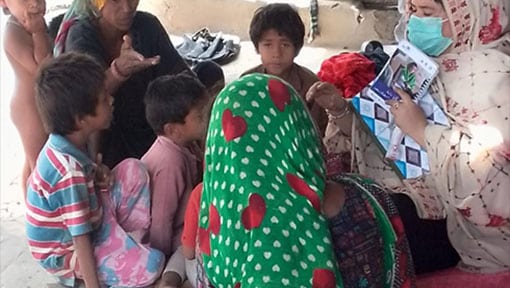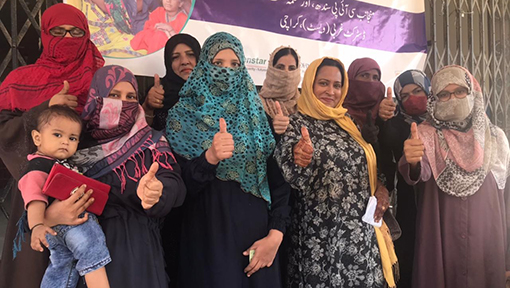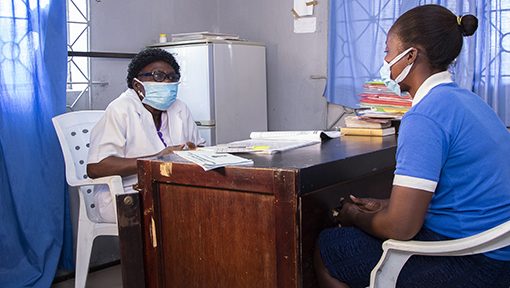Engaging Boda-Boda Operators to Promote Reproductive Health Services for Adolescents in Uasin Gishu County, Kenya
Contributor: Assumpta Matekwa

Boda-boda riders’ link person, Amos Kipleting, shares a moment with peers Alex Kiprono and Duncan Kisanya in Turbo Sub-county, Uasin Gishu County, Kenya.
“Boda-bodas” are bicycle or motorcycle taxis commonly found in urban areas of East Africa. Boda-boda drivers have been known to take advantage of young women and girls that do not have the funds to pay them for their services, especially in poor urban areas. This practice of exchanging sex for free rides is believed to contribute to high rates of unplanned pregnancies.
In an effort to reduce the high teenage pregnancy rate of 22% (Kenya DHS) in Uasin Gishu County, the Department of Health asked The Challenge Initiative (TCI) – locally referred to as Tupange Pamoja – for its support to adapt and implement a package of high-impact best practices, including a male engagement approach, to engage men as partners, advocates and users of family planning. The male engagement approach was adapted to specifically target boda-boda operators, among other men. Amos Kipleting Melly, a 32-year-old boda-boda operator, said targeting his colleagues made sense.
The challenges young people face every day in our communities – particularly sexually transmitted infections, unwanted pregnancies and unsafe abortions – are unresolved. These issues are personal. I have never impregnated anyone’s daughter but, I have witnessed a case in which my fellow boda-boda operator assisted a client who did not have money. And with this challenge, he asked for sexual favors from the girl and kept pestering her. As a result, I know this issue of unintended pregnancies is huge.”
Many boda-boda operators also hold deeply entrenched myths and misperceptions about condoms. Duncan Kisanya, a 26-year-old boda-boda operator, explained:
Some youth believe that the condom causes cancer and that the lubricant is bad. Others say that it causes itching or can burst while using. But, for me, I have proven that the condom does not have any adverse effects. I have used it and the condom is 100% safe.”
With support from Tupange Pamoja, the Department of Health and other stakeholders conducted sensitization meetings with boda-boda operators on reproductive health, including preventing pregnancy and sexually transmitted diseases and HIV, joint decision-making between couples to ensure healthier outcomes, and properly using and negotiating condom use. Coaching sessions with the boda-boda operators are held regularly to review challenges they may experience. Some of them have now become champions, reaching out to their peers with information and even making referrals to facilities for contraceptive services. In addition, the Department of Health and Tupange Pamoja have provided storage rooms or places to pick up condoms to ensure a regular supply; space to hold regular meetings to discuss AYSRH issues; community roadshows to educate and distribute IEC materials; and small rewards for attending such events, such as t-shirts and reflectors with key messages.
After Tupange Pamoja’s male engagement intervention, many changes happened in the lives of the boda-boda operators and their communities. Amos shared:
We have been able to assist many youth. I have referred young boys with STI/STDs to the Sub County hospital who have come back to appreciate that I actually assisted them because most felt embarrassed going to hospital with such conditions and needed a lot of privacy and confidentiality. Some have been tested HIV-positive and are on treatment. I wish to thank the management of Turbo Sub-County because, as an individual, I have realized many changes in my boda-boda service. … I believe I will be able to take care of myself and protect my family and live longer without incurring treatment for HIV, STI and I believe we shall continue to educate and encourage each other to live better lives and uphold our moral values.”
Mr. Kennedy Okwara, the Community Health Extension Worker (CHEW) of Turbo Sub-county, explained the significance of this intervention from his point of view.
They have a good platform to engage men because they have formal self-help groups registered with Ministry of Youth, Gender, Culture & Social Services. Each group can have over 100 registered members, with elected officials running the groups with guiding principles and weekly meetings. The good thing about these groups is that they are well-structured, easy to find and we work very well with their representatives. When they have an incidence, they follow-up the affected individuals and provide support and linkages to relevant institutions. We have more than 500 operators in various stages and we reached only a fraction of them. We need to do more.”
Engaging men as family planning users can be challenging; however, it is critical to do so to reduce the rates of unintended pregnancies.






